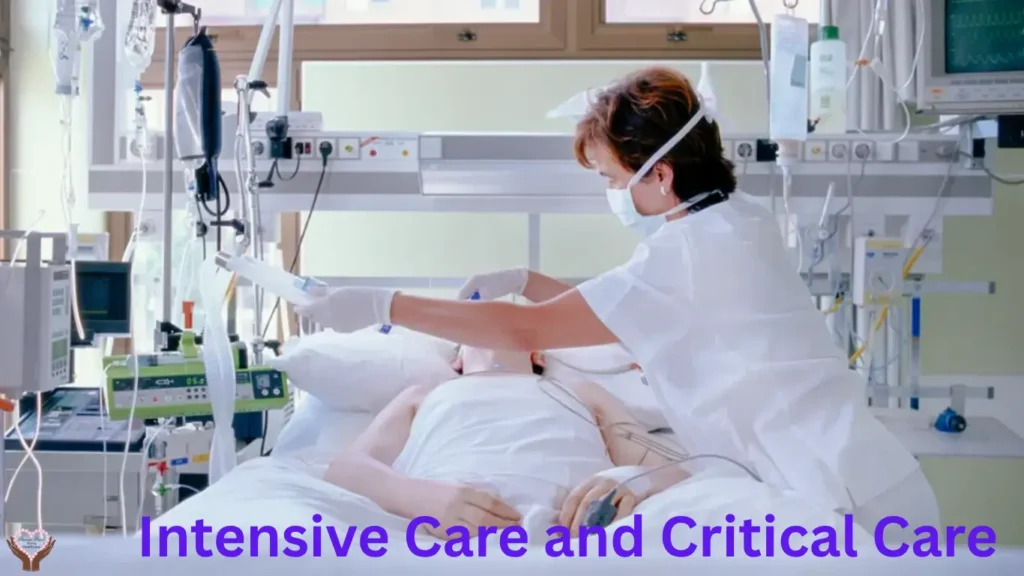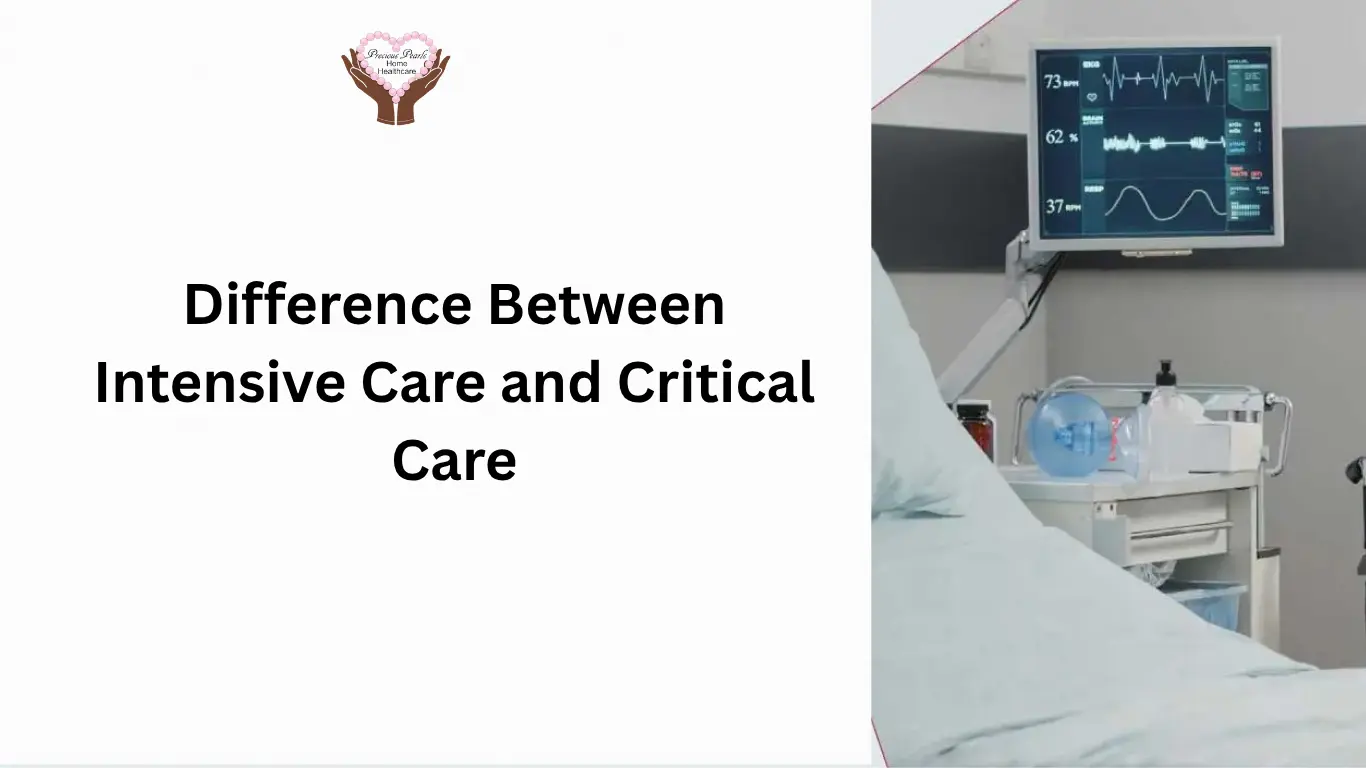In some circumstances when an individual you love is gravely sick or is undergoing an extreme health condition, hearing such phrases as intensive care and critical care may become daunting. These are the terms which are interchangeably used in hospitals yet they do not carry an identical meaning. Being aware of the distinction may enable you to make more educated choices and feel prepared to make your way through this system.
Intensive care is normally a particular unit or section of any hospital with specialized gears or instruments and specialized personnel, even as critical care refers to the quality or nature of care prompted to patients, who are suffering life-threatening situations- regardless of the place. Whether they are placed in an ICU or are undergoing high-level care somewhere in the hospital, it is important to understand what each of this kinds of care involves. This blog explores difference between intensive care and critical care.
Understanding the Terminology
Intensive care is the type of treatment that is offered to patients with life-threatening conditions. It includes nearby, continuous attention and provision by a team of uniquely prepared healthcare providers. ICU patients usually need sustenance of essential activities like breathing, circulation and organ functioning.
Typical reasons that lead to intensive care are recovery after surgery in case of major surgical interventions, critical infection, traumatic injuries, and severe respiratory diseases. Intensive care aims at stabilizing the patient so that he or she can receive 24-hour care within a highly controlled environment.
Critical Care is the wider term that defines diagnosis and management of life-threatening conditions with the use of sophisticated and invasive organ support and invasive monitoring is referred to as critical care. It can take place in a special unit (ICU), however, it can spread to other departments where high-acuity provision is done. Critical care is the field that is concerned with the patients having a critical condition, per se, regardless of the hospital where these patients may be in a unit. This can be in terms of emergency, special units or even step-down care units in case of patients coming out of the ICU.

Core Differences Between Intensive Care and Critical Care
Scope of Treatment
A setting (usually the ICU) is called intensive care whereas critical care is a form of treatment. This is a significant difference. Every patient being dealt with in an ICU is under critical care, yet not every patient under critical care is in an ICU. As an illustration, a patient can be given critical care measure in an emergency room or a high-dependency unit prior to his shifting to ICU or to any other department.
Facility and Staffing Differences
ICUs are special sections of a hospital that is designed with sophisticated equipments and negative pressure wards in addition to being always observed. Critical care, however, might occur at different sections of the hospital. There is also slight variation in staffing. Nurses and doctors in ICUs are normally ICU certified and trained. Intensivists Critical care doctors (intensivists) can also be consultants at other departments or they can be mobile in different units rendering critical care.
Patient Conditions and Severity
Patients in intensive care units usually experience the failure of several organs or problems that demand the use of mechanical systems to support life (ventilators, dialysis devices). Different patients who qualify as critical care patients are individuals who require intense short-term monitoring and those in unstable condition where they may require some sort of life-saving intervention.
In short, every patient in an ICU is a critical patient, but not every critically ill patient will have to be in an ICU as long as he/ she is stable enough to be treated in another location.
When Is Each Type of Care Required
Situations Requiring Intensive Care
Patients usually enter the ICU when they need post-operative monitoring, mechanical ventilation as a result of respiratory failure. The treatment of septic shock or sepsis, ongoing cardiac surveillance, and traumatic injury treatment (e. g. A. internal hemorrhage and brain damage). Rapid intervention and minute-by-minute monitoring are crucial in the intensive care unit (ICU), which is the hospital’s highest level of care, and conditions that require critical care.
Conditions Calling for Critical Care
Conditions like the following are treated with critical care. Acute cardiac failure, brain trauma or a stroke, excruciating burns, overdoses of drugs that necessitate organ support and abrupt instability of chronic conditions. These cases are monitored by intensivists or critical care physicians who decide whether high-acuity care can be provided elsewhere or if complete intensive care unit support is required.
Are These Two Interchangeable Terms
Despite the fact that they are frequently used interchangeably in informal settings the terms are not interchangeable. Critical care is a medical specialty and a way of providing care while intensive care refers to a physical facility or department. Nevertheless the two work hand in hand in many hospitals. An ICU patient is receiving critical and intensive care. However they might still need critical care monitoring in a less intensive setting after they stabilize and leave the intensive care unit. When a patient is no longer in the intensive care unit you may hear the phrase hes in critical care for this reason. The language used depends on the patients condition and the requirements of their treatment.
Choosing the Right Facility for Your Loved One
Asking questions like these is acceptable if your loved one is advised to receive intensive or critical care.
- Is this care taking place in an intensive care unit?
- Which experts will be participating?
- What are the objectives of the treatment during this time?
- How long is critical care or intensive care unit stay usually required for this condition?
- What occurs following the ICUs discharge?
You can advocate for the best care possible and understand the plan if you and the doctors and nurses communicate clearly.
Conclusion:
Making sure your loved one gets the appropriate care at the appropriate time requires more than simply knowing hospital jargon it also involves understanding the distinction between critical care and intensive care. Critical care can be given in a variety of settings and stresses the degree of support a patient requires whereas intensive care concentrates on specialized hospital units like the intensive care unit. Families can feel more in control during uncertain times ask better questions and set clearer expectations when they are aware of these differences.
Most significantly it gets you ready for whatever comes next be it recovery ongoing hospital care or moving to home-based support. Caring for your loved one at home is crucial if they are recovering from a serious illness or being released from the hospital. A safe and comfortable recuperation at home is ensured by the professional individualized assistance of Precious Pearls Health Home Care. Let us be your dependable travel companion. Learn how we can assist you and your family by getting in touch with us today.
FAQs
No not always. Treating life-threatening illnesses is a part of both. One environment where critical care is provided is intensive care.
Indeed some patients receive critical care in high-dependency units or emergency rooms while they wait for ICU beds to become available.
ICU patients usually have life-threatening conditions that need ongoing care and attention.






